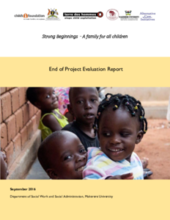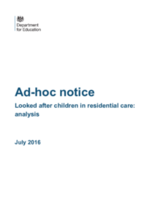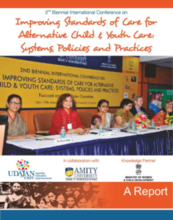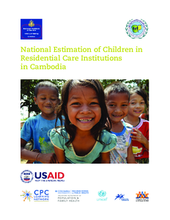Displaying 961 - 970 of 1510
This study examined whether interventions in Russian Baby Homes promoting warm, sensitive, and responsive caregiver-child interactions and relationships would be associated with advantages in those children’s behavior years after they transitioned to family care.
This statistical release provides information about looked after children in England for the year ending 31 March 2016, including where they are placed, their legal status, the numbers starting and ceasing to be looked after, and the numbers who go missing or are away from their placement without authorisation.
High levels of psychotropic medication use and polypharmacy are common for emotionally and behaviorally troubled youth entering residential care.
This article aims to assess the relevance of Western youth development models to adolescents in institutional care in India. The authors review three frameworks for positive youth development.
Strong Beginnings (SB) was an 18-month project purposed to promote an alternative care model that places emphasis on family based care of children, improving the quality of care within child care institutions, build capacities of government and non-government agencies in implementing alternative care; generate evidence and promote learning.
This research examined psychological and background correlates of bullying in adolescent residential care. Young people aged 11–21 (N = 601) from 22 residential institutions in Croatia completed an anonymous self-reported bullying questionnaire, the Basic Empathy Scale, the Rosenberg Self-esteem Scale and the Big Five Personality Inventory.
This country care review includes the care-related Concluding Observations adopted by the Committee on the Rights of the Child.
This analysis was produced as part of an independent review into children's residential care in England and provides data on children living in all types of residential care facilities in the country as of 31 March 2015.
This report contains detailed discussions that occurred during conference sessions. The first day focused on Caregivers. The second day focused on aftercare services. This report contains Article 20 UN Convention on the Rights of the Child. It provides background information on alternative care, which includes a definition and an overview of the alternative care situation in South Asia. It also includes some key guidelines from the UN Guidelines for the Alternative Care for Children.
This document discusses how there is increasing international mobilization around the importance of family care for optimal child development.






